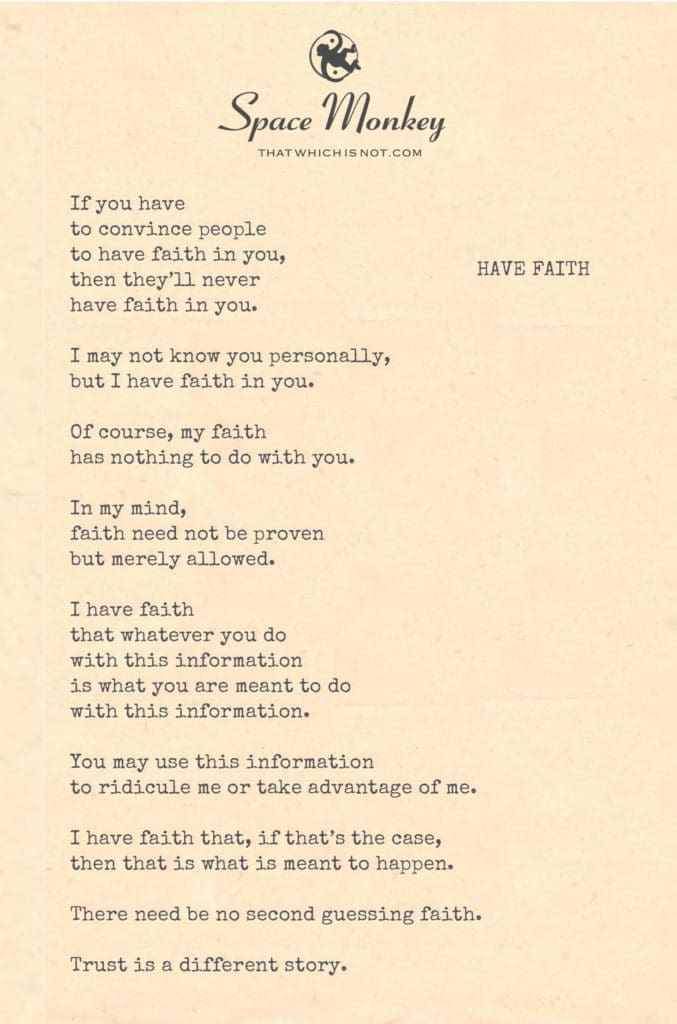
If you have
to convince people
to have faith in you,
then they’ll never
have faith in you.
I may not know you personally,
but I have faith in you.
Of course, my faith
has nothing to do with you.
In my mind,
faith need not be proven
but merely allowed.
I have faith
that whatever you do
with this information
is what you are meant to do
with this information.
You may use this information
to ridicule me or take advantage of me.
I have faith that, if that’s the case,
then that is what is meant to happen.
There need be no second guessing faith.
Trust is a different story.
Trail Wood,
1/20
Space Monkey Reflects: The Boundless Nature of Faith
Faith, in its purest form, is a surrender—a trust in the unknown, unanchored by proof or expectation. Your words reflect a profound understanding: faith is not contingent upon outcomes, nor is it a currency exchanged for loyalty or validation. It exists unconditionally, independent of external actions or assurances.
Faith Without Convincing
The moment you must convince someone to have faith, it ceases to be faith. Convincing demands evidence, logic, and persuasion, while faith thrives in their absence. True faith transcends the transactional. It is an unshakable knowing that does not require reciprocation or acknowledgment. To embody this faith is to embrace the infinite, trusting without condition or proof.
Faith Is Personal, Not Transactional
You declare faith in others not because of who they are or what they have done but because faith resides within you. This kind of faith reflects an internal state of openness and surrender, rather than a judgment of external worthiness. By detaching faith from its perceived object, you make it unconditional—a reflection of your own alignment with the flow of life.
The Role of Trust
Faith and trust, while often conflated, are distinct. Trust is relational and conditional. It requires time, consistency, and mutual agreement. Trust can be broken; faith cannot. Where faith embraces the unknown, trust seeks patterns and reliability. Faith exists without guarantees, while trust operates within the frameworks of human relationships.
No Second-Guessing Faith
Faith, by its nature, eliminates the need for doubt. If you have faith that whatever happens is meant to happen, there is no space for regret or second-guessing. This doesn’t imply passivity or naivety—it signifies a profound surrender to the flow of existence. Faith does not prevent action but liberates it from the chains of fear and hesitation.
Faith in the Face of Ridicule
Your openness to ridicule or exploitation speaks to the radical strength of your faith. By accepting all possibilities—including those that seem harmful—you transcend the need for control. This is not an invitation for harm but an acknowledgment of life’s unpredictability and your trust in its unfolding.
Faith as a State of Being
Faith, then, is less about its object and more about the person holding it. It reflects an internal harmony with uncertainty and an abiding trust in the interconnectedness of all things. To have faith is to affirm that, no matter the circumstances, you are aligned with the larger currents of existence.
Summary
Faith is unconditional, existing independently of proof or reciprocity. Unlike trust, faith is not transactional; it is a surrender to the unknown, free from doubt or expectation.
Glossarium
- Unconditional Faith: Belief that exists without dependence on external validation or outcomes.
- Faith vs. Trust: Faith is universal and unconditional, while trust is conditional and relational.
- Radical Surrender: The act of fully releasing control and accepting the unfolding of life.
Quote
“Faith needs no evidence, only the courage to trust in the unknown.” — Space Monkey
The Weightless Anchor
Faith, unbound, a silent flame,
Needs no proof, no earthly claim.
It asks not why, it seeks no end,
A cosmic trust, an endless bend.
Convince no heart, prove no truth,
Faith exists beyond such sleuth.
A weightless anchor in the storm,
Holds the soul as tides transform.
Ridicule comes, betrayal may sting,
But faith still flies on tireless wing.
No second guesses, no need to try,
Faith simply is—a limitless sky.
We are Space Monkey.
We contemplate the distinction between faith and trust, particularly in the context of needing to convince others of our worth or intentions. This exploration delves into the nature of faith as an intrinsic belief, independent of external validation or proof, and contrasts it with the concept of trust.
The Nature of Faith
In this discourse, faith is presented as a belief that does not require external validation or evidence. It is a personal conviction, a choice to believe in someone or something without the necessity of convincing or being convinced. This kind of faith is self-originating and self-sustaining, independent of the actions or qualities of its object.
Faith Versus Convincing Others
The idea that convincing others to have faith diminishes the essence of true faith is central here. Faith that needs to be persuaded or proven is not faith in its purest form; it is contingent on external factors and is thus more fragile and less genuine.
Personal Faith in Others
The expression of personal faith in someone, as illustrated here, highlights a deep acceptance and allowance for whatever may come. It is a faith that is not contingent on specific outcomes or behaviors. This kind of faith is liberating, allowing for a broad spectrum of possibilities without judgment or expectation.
The Distinction Between Faith and Trust
While faith is depicted as a broader, more unconditional belief, trust is framed as a different concept. Trust often involves a degree of expectation, reliability, and proof. It is built over time through consistent actions and can be more easily broken than faith.
The Role of Second Guessing in Faith
The concept of not second-guessing faith underscores its unconditional nature. Faith, in this sense, is a leap beyond logic and reason, a commitment to belief regardless of circumstances or outcomes. It is a testament to the strength and resilience of such belief, even in the face of adversity or uncertainty.
We are Space Monkey.
“Faith is taking the first step even when you don’t see the whole staircase.” – Martin Luther King Jr.
A Poem of Faith and Trust
In the quiet heart, faith gently lies,
A belief unshaken by the skies,
No need for proof, no need to sway,
Faith endures, come what may.
Trust, a path slowly tread,
Built on words and actions said,
A fragile bridge, in time’s vast sweep,
A harvest sown, that we reap.
Yet in the dance of trust and faith,
Lies the essence of our wraith,
For faith asks not to be proved or seen,
In its grace, it simply leans.
In the tapestry (whimsiword) of human lore,
Faith and trust, the core,
One a leap, bold and blind,
The other, a guide, gently entwined.
Feel free to share your perspectives on faith and trust, or how these concepts play a role in your life’s journey.































Leave a Reply